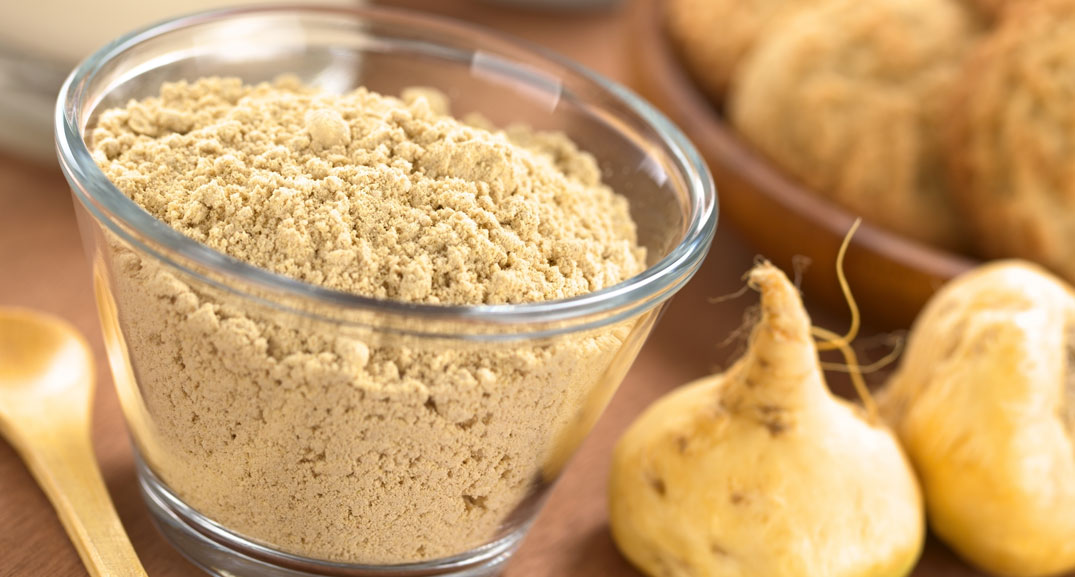
What the Heck is Maca Root?
Maca root known by its scientific name, Lepidium meyehil is also referred to in the media as an adaptogen which is a group of plants that are used to ‘help the body cope with stress’. Adaptogens have been used in Eastern medicine for hundreds of years, and we are hearing more about them recently. So let’s explore what the heck is maca root?
Maca Root
It’s grown in the Andes of central Peru in very harsh conditions. Maca has a similar appearance and size as radishes and turnips, with green tops and roots that range in colour. The edible part of the plant is the root. It’s available in powdered form and supplement at health food stores and pharmacies. In Canada and the USA, the powder is popular because it can easily be incorporated into foods and beverages, including lattés and smoothies.
Proposed Health Benefits
Maca root is good source of carbohydrates, protein, rich in antioxidants and is high in vitamin C, copper and iron. However, there are limited well-designed quality research studies about maca root’s proposed health benefits.
Male Fertility
According to an article that was published in the Journal of Evidence-Based Complementary and Alternative Medicine in 2015, maca may have an effect on semen parameters and semen hormones in men (1). In the pilot study, 20 volunteers (age 20 to 40 years) agreed to consume: 1.75g of maca per day or placebo for 12 weeks. Results showed that, both, sperm concentration and motility showed “rising trends” compared to placebo.
Menopause
Maca may have an impact on early-postmenopausal women. In the 2006 study, 124 early-postmenopausal women (over the age of 49) were randomly placed into two groups: placebo group or Pre-Gelatinized Organic Maca treatment group (2). The participants agreed to consume two 500mg capsules with either maca or placebo for 3 or 4 months. Results showed that the Pre-Gelatinized Organic Maca treatment group had a reduction in frequency and severity of two individual menopausal symptoms in particular: hot flushes and night sweating.
In a more recent study published in 2015, maca root could be used as a treatment for sexual dysfunction caused by antidepressants in women (3). Forty-five female outpatients (mean age 41 +/-12.5 years) agreed to either consume: 1500mg maca or control for 12 weeks. The participants were assessed biweekly with various tests including the Arizona Sexual Experience Scale and the Massachusetts General Hospital Sexual Function Questionnaire, and the Clinical Global Impression-Severity Scale and Clinical Global Impression-Improvement Scale. Results showed that remission rates of sexual dysfunction were higher for the maca compared to the placebo group. The study concludes that there may be factors, such as androgen levels, that may mediate the efficacy of maca treatment.
Blood Pressure
Maca may reduce symptoms such as blood pressure and depression in postmenopausal women (4). In this crossover study, 29 postmenopausal Hong-Kong women agreed to consume: 3.3g of maca or placebo per day for 6 weeks then followed by consumption of the other for another 6 weeks. Results showed that there was a significant decrease in diastolic blood pressure and depression after the maca treatment.
Questions of Concerns
Better designed research is needed to confirm the proposed health benefits, dosage amounts and best form of consumption for both men and women. Maca root should not be consumed raw. The current research is recommending that maca may interfere with the normal function of the thyroid gland. And pregnant or breastfeeding woman should also speak to their dietitian or health professional before consuming maca.
Final Thought
Proceed with caution. Remember no single food or ingredient gives the benefits of daily healthy habits including a balanced dietary pattern, exercise and restful sleep.
I’d love to speak at your upcoming conference or event
about latest food and nutrition trends. Click here to learn more.
References:
- Melnikovova I, Fait T, Kolarova M, Fernandez E, Milella L. Effect of Lepidium meyenii Walp on semen parameters and serum hormone levels in healthy adult men: A double-blind, randomized, placebo-controlled pilot study. Evidence-Based Complementary and Alternative Medicine. 2015: 1-6.
- Meissner H, Mscisz A, Reich-Bilinska H, Kapczynski W, Mrozikiewicz P, Bobkiewicz-Kozlowska T, Kedzia B, Lowicka A, Barchia I. Hormone-balancing effect of pre-gelatinized organic maca (Lepidium peruvianum Chacon): Physiological and symptomatic responses of early-postmenopaisal women to standardized dose of maca in double-blind, randomized, placebo-controlled, multi-centre clinical study. International Journal of Biomedial Science. 2006: 360-374.
- Dordling C, Schettler P, Dalton E, Parkin S, Walker R, Fehling K, Fava M, Mischoulon D. A double-blind placebo-controlled trial of maca root as treatment for antidepressant-induced sexual dysfunction in women. Evidence-Based Complementary and Alternative Medicine. 2015: 1-9.
- Stojanovska L, Law C, Lai B, Chung T, Nelson K, Day S, Apostolopoulos V, Haines C. Maca reduces blood pressure and depression, a pilot study in postmenopausal women. Climateric. 2015; 18: 69-78.
Copyright © 2018 Jane Dummer | All Rights Reserved

